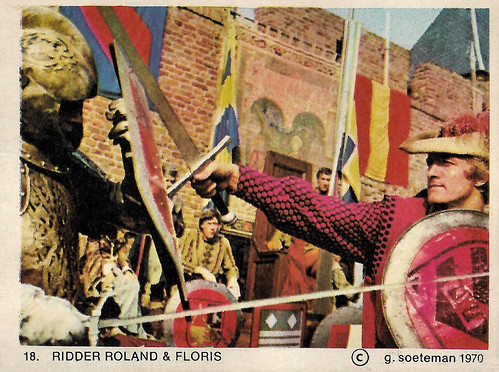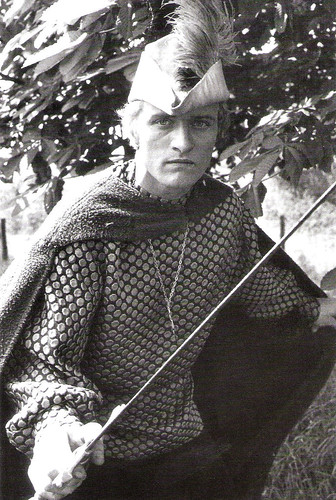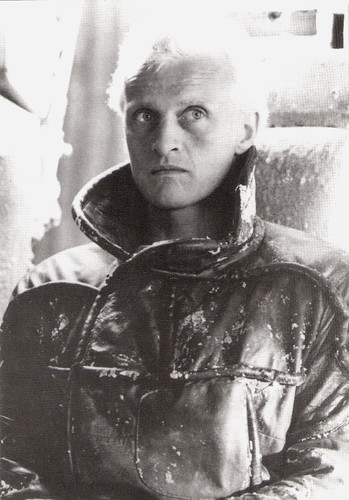
Dutch collectors card by Monty, no. 1, 1970. Photo: Gerard Soeteman. Rutger Hauer in the TV series Floris (Paul Verhoeven, 1969).

Dutch collectors card by Monty, no. 18, 1970. Photo: Gerard Soeteman. Rutger Hauer in the TV series Floris (Paul Verhoeven, 1969).

Dutch collectors card by Monty, no. 21, 1970. Photo: Gerard Soeteman. Rutger Hauer in the TV series Floris (Paul Verhoeven, 1969).
A bit of a rebel
Rutger Oelsen Hauer was born in Breukelen, the Netherlands in 1944 in a family of actors. His parents, Arend Hauer and Teunke Hauer-Mellema, operated an acting school in Amsterdam. Because both his parents were often off working, he and his three sisters were raised by a nanny.
A bit of a rebel during his childhood, he chafed at the rules and rigours of school and was often getting into mischief. His grandfather had been the captain of a schooner and at age 15, Hauer ran away to work on a freighter for a year. Upon his return, he attended night school and started working in the construction industry. When he again bombed at school, his parents enrolled him in drama classes.
He then worked for five years for the Noorder Compagnie, a Dutch stage company. His screen career began in 1969 as the hero in the popular Dutch television series Floris (Paul Verhoeven, 1969), a medieval action drama. The role of the dashing knight made him famous in the low countries, and Hauer reprised his role for the German remake, Floris von Rosemund (Ferry Radax, 1975).
Hauer's career changed course when Paul Verhoeven cast him in Turks fruit/Turkish Delight (1973) opposite Monique van de Ven. The sensual and tragic romance found box-office favour abroad as well as at home. It brought him several international offers. In Germany, he made the exploitation film Pusteblume//The Blonde Love Machine (Adrian Hoven, 1974) and the thriller Das Amulett des Todes/Cold Blood (Ralf Gregan, Günter Vaessen, 1975) with Vera Tschechowa. Hauer was invited to make his English-language debut in the British film The Wilby Conspiracy (Ralph Nelson, 1975) opposite Sidney Poitier and Michael Caine. Set in South Africa, the film was an action drama with a focus on apartheid. Hauer's supporting role, however, was barely noticed in Hollywood, and he returned to Dutch films.
Hauer reunited with Monique van de Ven and Paul Verhoeven for Keetje Tippel/Katie Tippel (1975). He worked again with Verhoeven on Soldaat van Oranje/Soldier of Orange (1977), and Spetters (1980), both with Jeroen Krabbé. Especially Soldaat van Oranje was a huge success and was instrumental in his international breakthrough. After making a television series and five films directed by Paul Verhoeven, they had a falling out on their last combined effort, the troubled Flesh+Blood (1985). The two would never work again. According to IMDb, Hauer turned down roles in both Verhoeven’s Robocop (1987) and Zwartboek/Blackbook (2006).

Dutch postcard by N.A.A., 2000. Photo: Rutger Hauer in Floris (Paul Verhoeven, 1969).

American postcard by Zoetrope Images LTD, Boston, Mass., no. 405. Photo: Rutger Hauer in Blade Runner (Ridley Scott, 1982).
Tears in the rain
Rutger Hauer made his American debut in the Sylvester Stallone film Nighthawks (Bruce Malmuth, 1981) as a psychopathic and cold-blooded terrorist named Wulfgar. The following year, he appeared in arguably his most famous and acclaimed role as the eccentric and violent but sympathetic anti-hero Roy Batty in the Science-Fiction thriller Blade Runner (Ridley Scott, 1982), in which role he improvised the famous tears in rain soliloquy.
Hauer went on to play the adventurer courting Theresa Russell in Eureka (Nicolas Roeg, 1983), the investigative reporter opposite John Hurt in The Osterman Weekend (Sam Peckinpah, 1983), and the knight paired with Michelle Pfeiffer in Ladyhawke (Richard Donner, 1985). He continued to make an impression on audiences in The Hitcher (Robert Harmon, 1986), in which he played a mysterious hitchhiker intent on murdering a lone motorist and anyone else in his way.
During the late 1980s and early 1990s, Rutger Hauer became well known to the British public for a series of humorous Guinness commercials where he is clad in black. His appearance is credited for an increase in sales of Guinness.
His films included Wanted: Dead or Alive (Gary Sherman, 1986), La leggenda del santo bevitore/The Legend of the Holy Drinker (Ermanno Olmi, 1989), the martial arts action adventure Blind Fury (Philip Noyce, 1989) and the Science-Fiction adventure The Blood of Heroes (David Webb Peoples, 1990).
Hauer acted in several British and American television productions, including Inside the Third Reich (Marvin J. Chomsky, 1982) as Hitler’s young architect Albert Speer, Escape from Sobibor (Jack Gold, 1987) for which he received a Golden Globe Award for Best Supporting Actor, Fatherland (Christopher Menaul, 1994), Amelia Earhart: The Final Flight (Yves Simoneau, 1994), Hostile Waters (David Drury, 1997), Merlin (1998), The 10th Kingdom (2000), Smallville (2003), Alias (J.J. Abrams, 2003), and Salem's Lot (Mikael Salomon, 2004).

French postcard by Editions Avant Garde, no. P549. Poster for Wanted: Dead or Alive (Gary Sherman, 1986).

German autograph card by Kino, 1989.
True blood
After years of mainly television and straight-to-video movies, Rutger Hauer made a kind of comeback in the cinema in the new century. He played an assassin in Confessions of a Dangerous Mind (George Clooney, 2002), a villainous cardinal with influential power in
In 2007, he published his autobiography 'All Those Moments: Stories of Heroes, Villains, Replicants, and Blade Runners' (co-written with Patrick Quinlan), where he discusses many of his roles. He returned to the Dutch cinema in films like Bride Flight (Ben Sombogaart, 2008), Oogverblindend/Dazzle (Cyrus Frisch, 2009), Black Butterflies (Paula van der Oest, 2011) with Carice van Houten, and as Freddie Heineken in De Heineken Ontvoering/The Heineken Kidnapping (Maarten Treurniet, 2011).
2011 turned out to be one of Hauer’s busiest years that was also highlighted by major parts as the Flemish painter Pieter Bruegel in The Mill & the Cross (Lech Majewski, 2011), a violent hobo in the neo-exploitation thriller Hobo With a Shotgun (Jason Eisener, 2011), and an undertaker in the horror film The Rite (Mikael Håfström, 2011). Among his last roles were Abraham Van Helsing in Dracula/Dracula 3D (Dario Argento, 2012) starring Thomas Kretschman, Michelangelo in the TV film Michelangelo - Il cuore e la pietra/Michelangelo (Giacomo Gatti, 2012), Maciste, a retired Mr. Universe in Il Futuro/The Future (Alicia Scherson, 2013), and the vampire Niall Brigant in the hit series True Blood (2013).
Hauer continued to make films till his death. He appeared in the French-American Western The Sisters Brothers (Jacques Audiard, 2018) with John C. Reilly, Jake Gyllenhaal and Joaquin Phoenix. The film won the Silver Lion for Best Direction at the Venice International Film Festival. It was the final feature film starring Hauer released during his lifetime.
Rutger Hauer was a dedicated environmentalist. He fought for the release of Sea Shepherd Conservation Society leader, Paul Watson, who was convicted in 1994 for sinking a Norwegian whaling vessel. Hauer had also established an AIDS awareness organisation called the Rutger Hauer Starfish Association. Since 1969 Rutger Hauer's partner was painter and sculptor Ineke ten Cate, whom he married in 1985. From a brief earlier marriage, he had a daughter, actress Ayesha Hauer (1966). His grandson is fashion model Leandro Maeder.
Official Trailer Flesh + Blood (1985). Source: Old Hollywood Trailers (YouTube).
Theatrical Trailer Blade Runner: Director's Cut (1992). Source: Cinematic Trailers (YouTube).
Trailer De Heineken Ontvoering/The Heineken Kidnapping (2011). Source: Afilmtube (YouTube).
Sources: Sandra Brennan (AllMovie - page now defunct), Wikipedia (English and Dutch) and IMDb.
This post was last updated on 26 August 2024.
No comments:
Post a Comment